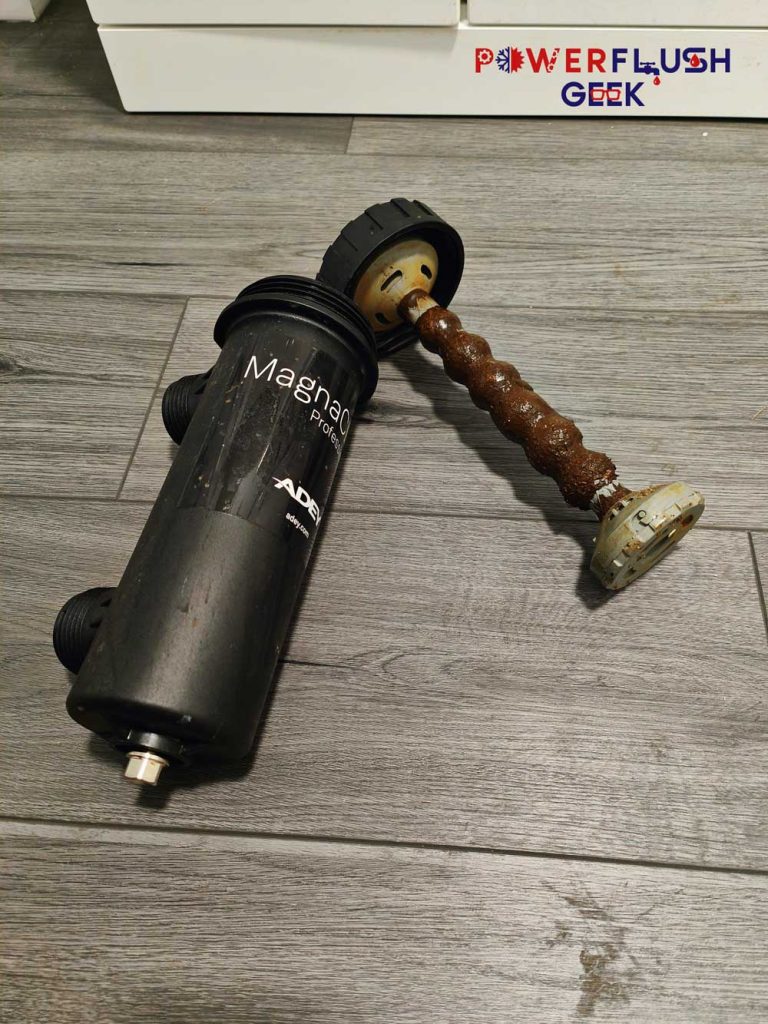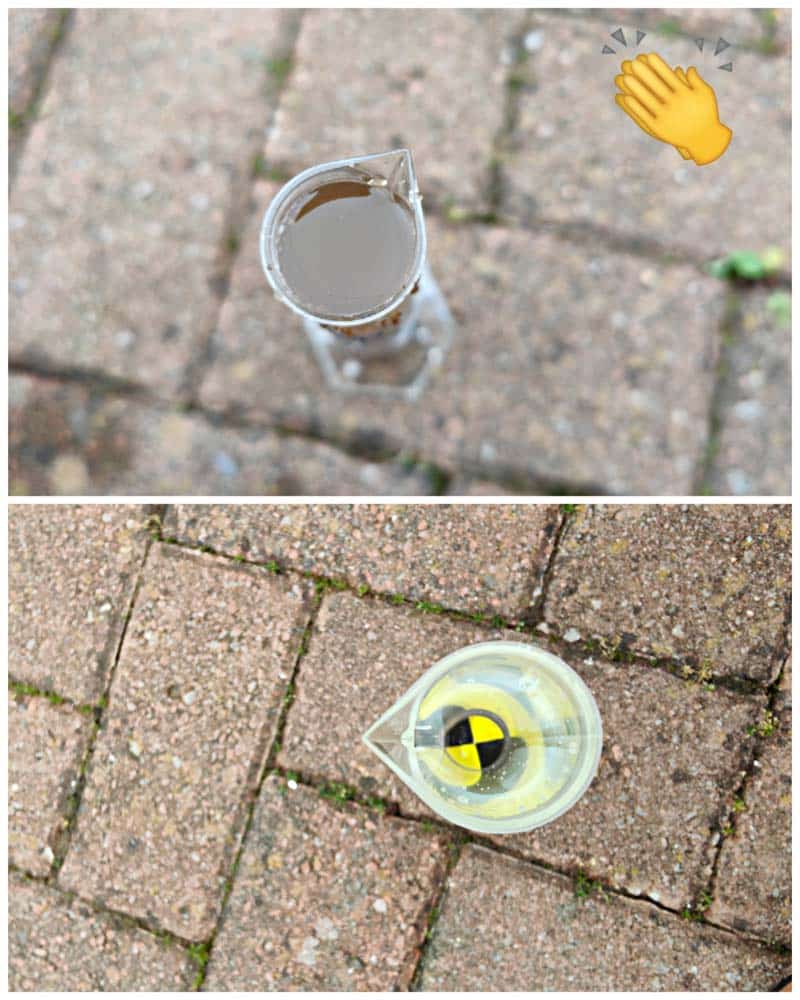Is Your Heating System Ready for Long-Term Care?
At Plumbisimo, we know how important keeping your heating system running smoothly is. We specialize in power flushing to remove sludge and debris from central heating systems, helping them perform better. After the power flush, it’s necessary to maintain your system to prevent future heating problems. Our experienced engineers offer powerflush aftercare to keep everything working well, avoiding issues like cold radiators or frequent boiler breakdowns.
How to Keep Your Heating System Clean After the Powerflush
- Install a Magnetic Filter
A magnetic filter would subsequently assist in maintaining the central heating system clean after a power flush. It captures metal particles and other materials that accumulate within the system. Without this filter, sludge can come back and cause heat issues, such as cold spots in the radiators. The filter saves pipes and radiators by gathering particles that may hinder circulation. It also serves as one of the ways with the help of which it is possible to guarantee the powerflush work effectiveness.
- Clean Filter Regularly
When using a heating system, you must clean the magnetic filter to ensure the central heating powerflush system works efficiently. The filter builds up debris and sludge within a certain period and may reduce the system’s overall efficiency. Cleaning also plays an important role in ensuring clean water always flows and avoiding such problems as noisy radiators. They do this to prevent blockages and to minimize the cases when the power flush will be needed. The clean filter will make the heating system run efficiently without requiring an additional flush.
- Annual System Water Quality Check
An annual water quality check keeps the whole system in good condition. It reduces the accumulation of sludge and debris in the radiators and the boiler, thus increasing its efficiency. A heating engineer will check the water quality, color of the water, pH Level, corrosion, and inhibitor level and possibly alter it if necessary. Some checks include checking the water, preventing heating issues, or bringing efficiency to the central heating system. It helps you to maintain the benefits of the power flush and no cold radiators.
- Annual boiler service
A boiler service keeps your central heating systems in good condition annually. Heating engineers will later inspect for some problems such as: noises in the boiler and heat exchanger efficiency. Maintenance prevents constant boiler failures and ensures efficient operation of the boiler. A service also ensures that the condition of the power system is checked to detect any issues arising in their early stages. The basic maintenance keeps the boiler and system running for years and maintains high heating efficiency.
- Add and Maintain Correct Inhibitor Level
In this regard, mixing the correct amount of inhibitor halts sludge formation and corrosion on the pipes and radiators. Suppressors maintain the system’s purity and avoid disturbances with the flow of hot water. It is advised to control the inhibitor level frequently to avoid this heating issue and cold areas in the heating system. This practice helps maintain the protection of your system and ensure the function of the water treatment conditioner. The right inhibition level is kept to prevent damage and to ensure high heating efficiency.
- Vent system and Bleed Radiators
Flushing the electrical heating systems and bleeding radiators eliminates the trapped air that may lead to heating problems. The presence of air in the system, such as noisy radiators or areas of the rooms that remain cold. To reduce the chances of causing these problems, one should bleed the radiators every 6 months. Bleeding causes the heat distribution to be consistent while preventing excess pressure accumulation within the boiler and the system. Periodically, the central heating should be vented to continue enjoying the powerflush’s advantages.
- Regular Heating System Maintenance
Proactive maintenance helps you avoid common issues affecting your heating systems. A central heating engineer can check on the system and repair any slight issue that may have occurred and may be persisting in the system. This care prevents the formation of debris and minimizes the chance of having problems with heating. Regularity ensures the removal of dust and other materials that may have settled on the pipes and radiators, improving the systems’ durability. It reduces the requirement of the new boiler, and it maintains the functionality of the central heating power.
- Check Boiler Pressure
Boiler pressure is an important factor that must be monitored if the system performs optimally to its capacity. This causes issues like cold radiators and low flow of hot water from low pressure. It is wise to check the pressure often to make sure the system has no problems. Remember that the pressure needs to be checked, and if it is too low, adding more water can help eradicate boiler noises and much more. This way, we keep the pressure up and reduce the chance of having to carry out more power work on the system.
- Address Leaks Promptly
To prevent heating issues, leaking should be managed and corrected quickly. A single drop can reduce the pressure of the boilers, thus making the system work less optimally. Sustaining leaks on the pipework or radiators maintains the system and helps avoid costly problems. According to our plumbers, checking for leaks frequently is recommended so that everything is in proper condition. Regular repairs ensure the leaks are fixed on time to prevent the costs of restoring the boiler and system where they would have been damaged.
- Regular Maintenance is a Small Investment with Long-Term returns
Regular checks and maintenance are an easy way to ensure your heating system is in good working condition. It helps you prevent major issues and maintain the advantages of the powerflush for a longer period. Effective prevention reduces the chances of heating issues and, hence, the cost of powerflush. A good system delivers constant hot water and heat in the areas it serves within the house.

Post-Powerflush Maintenance Essentials For Your Home’s Central Heating System
Regular Bleeding of Radiators
When the powerflush work is completed, air pockets in the radiators may lead to cold areas. Draining the air from radiators cause bleeding of the radiators and thus enhances the heating system’s efficiency. The bleeding radiators enable them to heat effectively throughout the house since it is done consistently.
Checking for Worn-Out Gaskets
Seals that exist on the boiler and the system may get worn out sometimes. If not replaced, they might leak and need to be replaced. Maintenance prevents the deterioration of gaskets and the discovery of leakages, which, when left for a long time, cause water loss in the system.
Cleaning Filters
Filters collect any material that may be introduced into the system. They are simply to clean to keep the system unclogged and ensure high efficiency. Clean filters also prevent damage to the boiler and system and their efficiency.
Maintain Constant Pressure of the Boiler
Combi boiler pressure must be maintained at the optimum level to work fine—low pressure results in noisy radiators and low hot water pressure. The pressure appliances ensure all the pressure gets balanced and enhance the heating system.

When to Call a Professional For Central Heating Powerflush
Cold Spots or Noisy Radiators
Only a heating engineer should be contacted if there are still cold spots or noisy radiators after basic cleaning. Such signs may point to other issues within the system existing at a different level of sophistication.
Pressure issues or Boiler sounds
If there is a steady pressure loss or there is always boiling noise, it must be a leakage or blockage. A central heating engineer can rectify these problems to ensure everything is in order.
Poor Heating Performance Due To Sludge
In case the system loses efficiency despite this, setting an expert inspection may be required. Our engineers can make your central heating system work like new again and minimize heating issues.
Water Leaks or Corroded Pipes
A leakage or eroded pipeline should not be taken lightly. Our plumbers can fix faulty parts or install new ones to keep the system functional.
FAQs
How Long Does a Power Flush Last?
A power flush usually lasts 5 to 7 years, depending on regular maintenance and the number of radiators in the system. We also help with new boiler installation.
How Long is a Power Flush Guaranteed For?
Guarantees for power services vary by provider. At Powerflush Geek, we offer a service guarantee to cover any issues related to the powerflush work within the agreed period.
What Happens During a Power Flush?
A powerful machine pumps clean water and cleaning chemicals through the system. This deep clean removes sludge, debris, and blockages, improving system performance.
Will a Power Flush Clear Blockages?
Yes, a power flush clears blockages caused by sludge or debris. If the blockage is severe, additional repairs may be required to restore the system fully.
Keep Your Heating System in Top Shape with Plumbisimo’s Affordable Power Flush Cost
Keeping your heating system clean after a power flush ensures it works efficiently and lasts longer. Regular maintenance, such as bleeding radiators, checking filters, and monitoring boiler pressure, can prevent heating problems and reduce the risk of costly repairs. If you experience any issues, our professional heating engineers and plumbers are here to help.
Contact Plumbisimo today to schedule a service. Call us at 07444 203 403 or email info@powerflush-geek.co.uk. We are ready to assist with all your plumbing and heating needs.






